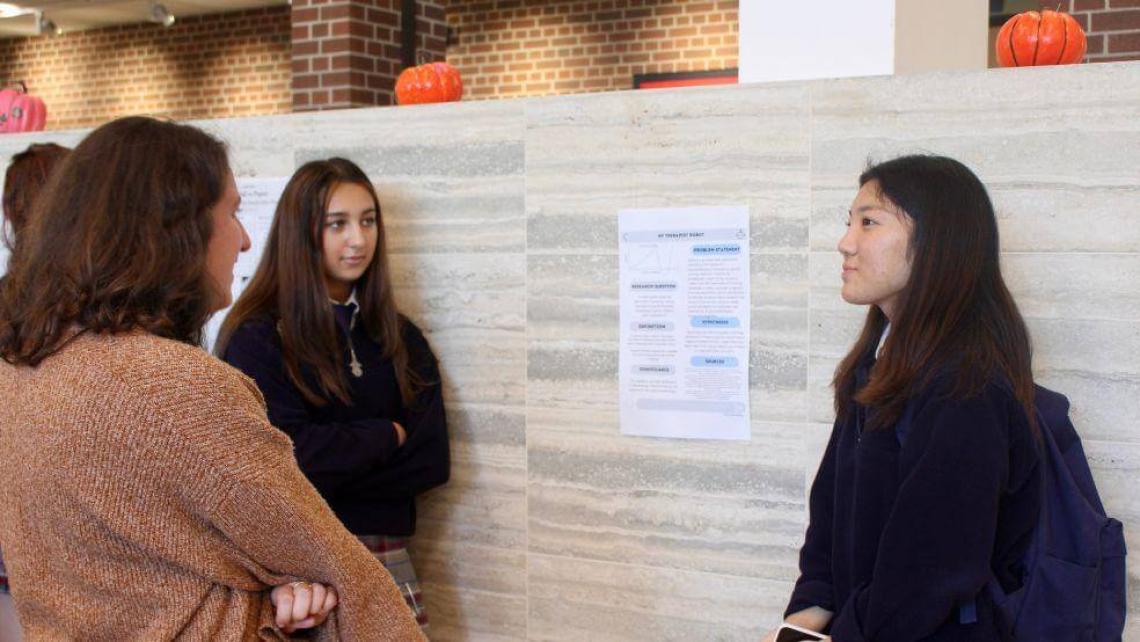Students in the Advanced Placement Research course at Trinity College School demonstrated confidence, creativity, critical thinking and communication skills as they presented their preliminary research topics to their peers and staff on Tuesday, October 25th. Held in Cirne Commons, the event saw each of the 20 students in the program create a poster about the question they will be exploring over the course of their year-long research project, explaining their plans and answering questions from students and staff who circulated to review the posters.
The AP Research course, taught by faculty members Shelagh Straughan, Myke Healy and Barbara Brough, is the second part of the two-year AP Capstone Diploma program. Students will spend the coming months designing their method, collecting and analyzing data and drawing conclusions. By the spring, they will have completed a 5,000 word research paper and taken part in a final presentation and defense of their work.
Tuesday’s community presentations provided AP Research students with the opportunity to share their work, with the bonus of having to explain and clarify. Feedback from the community will help many of them refine their focus and determine next steps moving forward.
This year’s preliminary AP Research questions are:
- Given that group influence has been shown to assist bettors in controlling “problem gambling” impulses, will secondary-school-aged participants performing betting activities in groups of three to four show more or less risk-taking tendencies than secondary-school aged participants performing the same activities alone? – Oliver Lynn
- Given the fact that users online struggle when it comes to creating strong passwords and tend to lean toward password reuse, to what extent can password policy be developed and applied to help users make stronger passwords and limit their reuse? – Tanay Langhe
- What is a morally sound and medically safe way to administer psychedelics, namely DMT (dimethyltryptamine), in recreational doses in a therapeutic setting to aid in crude fear memory extinction, readily accessible for the population that can’t be treated through classic therapy or modern medicine? – Jeremiah Lefebvre
- Which treatment method would be most effective, by providing meaningful pain relief, when treating adult patients with psychogenic pain, a type of chronic pain without a physical source? (Meaningful pain relief: the management of pain, either by controlling it at its current state or reducing its impact, ultimately improving the patient’s quality of life.) – Carmella Ylagan
- To what extent do the personalities of private secondary school students in Ontario increase their fit in future professions? (Personalities: According to the “16 personalities” test and the big five personality traits – openness, conscientiousness, extraversion, agreeableness, neuroticism. Fit: A combination of overall job satisfaction, engagement and productivity which is measured through the PERMA (positive emotion, engagement, relationships, meaning, accomplishments) model and theory in correlation to their selected job.) – Phillip Whan Tong
- How different is the impact of hospital job satisfaction among nurses on patients in the private and public sector? – TianTian Dong
- To what extent does VLE (Virtual Learning Environment) (asynchronous) affect the procrastination of Canadian high school students? – Junh Hong
- To what extent might noise pollution caused by drones affect ants that prey on pests and as a result impact agricultural yield. – Tae-Kyeong Kim
- How does the knowledge of young men about menstruation, specifically period products and period poverty, affect menstruation equality? – Nina Gardes
- How closely does TikTok’s BoPo content align with the theoretical components of positive body image? – Jasmine Chen
- How does rheumatoid arthritis patients’ confidence level in artificial intelligence (AI) diagnosis correspond with varying accuracy of AI algorithms? – Asseel Abdalla
- To what extent is the iPad and Apple Pencil a more effective aid for memorization and retention for high school students in Grades 11 and 12 than using a pen and paper for handwritten lecture notes? – Alexa Braganza
- To what extent may the degradation of common morals spur the decaying of communities and, consequently, foreshadow the collapse of a nation? – Silas Hodges
- To what extent does the discomfort caused by human likeness of psychotherapist computer programs affect a user’s experience? – Hannah Hwang
- To what extent can soil composition mitigate the effect of acidic deposition on radish growth patterns? – Amelia Maggi
- What is the most effective way for a secondary school to assist students who feel uncomfortable during mandatory social events? – Kyra Fingas
- To what extent does music therapy benefit children on Autism Spectrum Disorder (ASD) in comparison to traditional psychological therapies using Applied Behavioural Analysis (ABA)? – Wesley Hoo
- Given the wealth of video relating to worldwide medical education on the site Youtube.com, what is the information quality or overall reliability of these videos and how can a standard of quality be implemented on the site to ensure reputability? – Hudson Brown
- To what extent are HTS material cables viable in wide-scale implementation for a province-wide energy grid? – Mitchell Baboolal
- To what extent do negative influencers on social media influence Emotional Intelligence through the lens of Black Boys? – Viana Biscoe
- View the AP Research Poster Presentations: October ’22 gallery for more photos.






